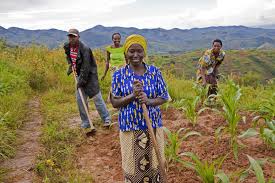International Women’s Day: Empowering Women Farmers
Mar 6th, 2014 | By admin | Category: Food and Hunger/AgricultureBy Suzanne York, www.howmany.org
As the world recognizes the 103rd International Women’s Day on March 8th, it is a good time to consider the role of women as an answer to improving food security, particularly in the face of global climate change.A recent report found that the narrowing of diversity in crop species contributing to the world’s food supplies has been considered a potential threat to food security. In a world of 7 billion people, projected to be over 9 billion by 2050, food is an issue of enormous concern. The less diverse our crops are, the greater the risk to the global food supply if a crop becomes threatened by climate change or pests.
The United Nations has warned there will be a doubling of demand for food crops by 2050, due to population and economic growth. The Food and Agriculture Organization recognizes women as a key to greater food security.
When women are empowered – with education, healthcare (including voluntary family planning services), property rights and sustainable livelihoods – it can make all the difference in the world. In terms of agriculture and food security, women are crucial to a better food future.
Women produce between 60 and 80 percent of food in developing countries and are responsible for half of the world’s food production. Sadly, these women farmers do so much work to put food on their family’s table, but are often the last to eat. They do the most to get food on the table – working the land, collecting firewood and water, and cooking the meal – and they are usually the last to eat it.
Last year, the Hunger Alliance released its report called Small Scale, Big Impact that found the single most important thing governments can do to end global hunger is to support the millions of poor women farming tiny plots of land in developing countries.
Turning Toward Tradition and Ecologically-Grounded Methods
Genetically modified foods are not the answer. But agroecology (which builds upon the traditional knowledge of family-based farmers and encompasses basic ecological principles for planning and managing sustainable agricultural systems), and tapping into traditional knowledge, are holistic solutions that increase food security.
In Rajasthan, India, Sahyog Sansthan was founded to help rural communities living in poverty. There, women farmers are increasing crop yields using sustainable and organic farming practices. Sahyog has regenerated thousands of acres of degraded land through soil and water management, small-scale irrigation, and sustainable agriculture, reaching 3,500 women.
In Ghana, groups such as Groundswell International and the Center for Indigenous Knowledge and Organizational Development are working with women’s groups around the country to create sustainable livelihood opportunities, such as livestock rearing and market gardening.
The organizations promote the concept that “agroecological methods are improving rural livelihoods and food security through increases in food and fuel wood production, increased abundance of fodder for livestock and access to natural resource-based enterprise development.”
Empowering Women Farmers
According to the Food and Agriculture Organization, there are some specific actions that can be taken to address some of the obstacles and constraints faced by women farmers:
- ensure that women have equal opportunities with men to own land;
- facilitate women’s access to agricultural services and tailoring such services to their needs;
- encourage the production of food crops through the use of incentives;
- improve the nutritional status of women and children;
- provide better employment and income earning opportunities;
- promote women’s organizations;
- review and re-orient government policies to ensure that the problems that constrain the role of women in food security are addressed.
Women are the primary caretakers of their families and of managing natural resources. By empowering them with property rights, education, health and reproductive rights, economic opportunities and decision-making authority, the end result will be families, communities, and local environments that are better off and more resilient in the face of increasing global challenges.
Suzanne York is a senior writer with the Institute for Population Studies.



